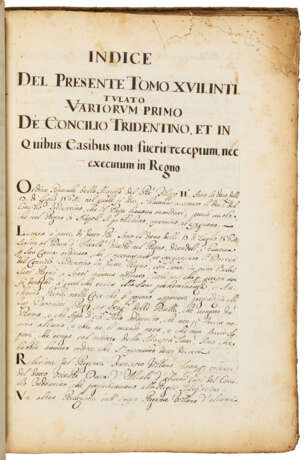ID 1129642
Lot 24 | Manuscript on the inquisition in Naples
Estimate value
$ 800 – 1 200
Two volumes, folio (220 x 320mm), 190 & 262 pages in Italian, Spanish and Latin, each in a separate hand (light foxing, losses to upper corners of first several pages of volume titled "Varioum Primus"). Contemporary paper boards (spine detached on second volume).
Naples during the Counter Reformation. A series of bound manuscripts, copied from various documentary sources from 1564 to 1615, many of which concern the Council of Trent's impact on the Kingdom of Naples. The majority of the wide-ranging writings are anti-ecclesiastical and describe, in depth, the intricate political intrigues at a time of heightened tensions that would boil over into open rebellion in 1647. Of particular interest are lengthy passages concerning bans on printing and books, including those prohibited explicitly by the church, those lacking the author's name, books from Germany and France as they were "infected with heresy," and the "Ecclesiastical Annals" of Baronio, ''for having condemned the monarchy of Sicily," and ordering that repeat offenders be expelled from the Kingdom. Several pages discuss specific cases, including the story of Lazzaro Scoriggio who in 1615 printed a the work of Paolo Antonio Foscarini, who advocated for Copernicus and argued that it was not in conflict with the Bible. A decree of 5 March 1616 banned any work advocating Copernicus, and in June 1616, the Archbishop's Court of Naples prosecuted Scoriggio for printing it. The printer attempted to pin the blame on the author, but the court found him guilty and fined him 100 ducats. Much more fascinating detail—a superb source for research.
| Address of auction |
CHRISTIE'S 20 Rockefeller Plaza 10020 New York USA | ||||||||||||||
|---|---|---|---|---|---|---|---|---|---|---|---|---|---|---|---|
| Preview |
| ||||||||||||||
| Phone | +1 212 636 2000 | ||||||||||||||
| Fax | +1 212 636 4930 | ||||||||||||||
| Conditions of purchase | Conditions of purchase | ||||||||||||||
| Shipping |
Postal service Courier service pickup by yourself | ||||||||||||||
| Payment methods |
Wire Transfer | ||||||||||||||
| Business hours | Business hours
|





